Film history is filled with iconic music themes that evoke strong emotions and cultural connections. Composers like John Williams and Ennio Morricone created unforgettable melodies in classics like *Star Wars* and *The Good, the Bad and the Ugly*. You've likely heard Williams' "Hedwig's Theme" from *Harry Potter* or Morricone's scores that shaped Westerns. These themes aren't just memorable; they've become a part of our collective consciousness, conjuring nostalgia and excitement. To discover more about the most impactful themes and their influence on popular culture, keep exploring this fascinating topic.
Overview of Iconic Themes
When you think of iconic music themes in film, certain melodies instantly come to mind, transcending their cinematic origins. These themes often become synonymous with the films themselves, creating a lasting emotional connection with audiences.
The BBC Music Magazine and RadioTimes.com conducted a poll in February 2019, revealing the top iconic movie themes, showcasing the power of film scores in shaping our cinematic experiences.
John Williams dominated the rankings, claiming six spots in the top ten, including the legendary theme from "Star Wars: A New Hope." This score alone accounted for nearly 21% of the votes, illustrating its profound impact. The use of high-traffic keywords in discussions about film music can further enhance audience engagement and search visibility.
Other notable compositions, like Howard Shore's score for "The Lord of the Rings: The Fellowship of the Ring" and Williams' "Harry Potter and the Philosopher's Stone," prove that iconic themes can span generations and genres.
The cultural significance of these film scores is undeniable, as they frequently appear in commercials, sporting events, and various media, ensuring their recognition continues to thrive. This blend of timeless melodies and powerful storytelling elevates film music to an art form that resonates beyond the screen, akin to the importance of strong passwords in securing digital experiences.
Top Film Themes Ranked
The list of top film themes ranked highlights the enduring power of cinematic music, with John Williams' "Star Wars: A New Hope" leading the pack, capturing nearly 21% of the votes in a recent poll. This theme not only defines one of the best film franchises but also resonates deeply with audiences worldwide. The impact of such themes can be likened to the responsive design of modern website themes that ensure optimal user experiences across devices. Additionally, just as SEO-friendly features enhance website visibility, these iconic themes enhance the overall cinematic experience.
Following closely in second place is Howard Shore's "The Lord of the Rings: The Fellowship of the Ring," which secured 5.85% of the votes. John Williams makes another appearance with "Harry Potter and the Philosopher's Stone" (Hedwig's Theme) at 5.4%. His dominance is further illustrated with six themes in the top ten, including "Jurassic Park" at fourth and "Raiders of the Lost Ark" at sixth.
Other notable entries in this ranking of iconic movie themes include Ennio Morricone's classic "The Good, The Bad and The Ugly" in fifth and Klaus Badelt's adventurous "Pirates of the Caribbean" rounding out the top ten.
This poll, conducted among 2,000 participants, showcases the timeless appeal of these film scores, proving that great music can elevate a movie to legendary status. Furthermore, the success of these themes can be likened to the user-friendly interface of popular blogging themes, which enhance the overall experience for both creators and audiences.
The Power of John Williams
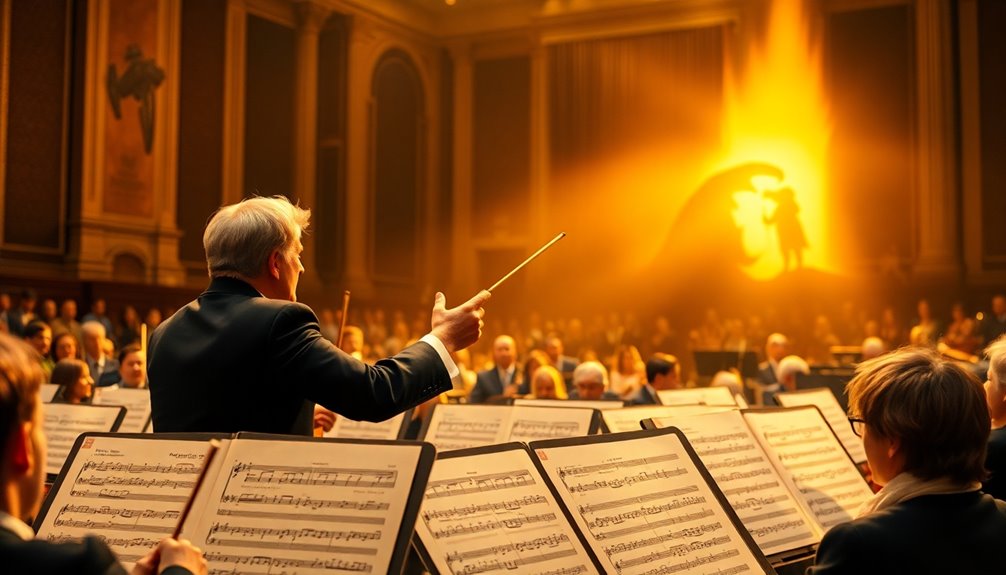
Few composers have had such a profound impact on the world of film music as John Williams. His ability to craft unforgettable movie theme songs has solidified his status as a cinematic legend.
In a recent poll by BBC Music Magazine and RadioTimes.com, six of his themes ranked in the top ten, showcasing his dominance in the industry. Iconic scores from films like Star Wars, Harry Potter, Jurassic Park, Raiders of the Lost Ark, Jaws, and Superman illustrate his versatility across genres.
The Star Wars theme, in particular, stands out, garnering an impressive 20.76% of the votes, a proof of its cultural significance and timeless appeal. With memorable melodies and distinctive motifs, Williams' compositions resonate deeply with audiences, making them instantly recognizable. His work exemplifies the importance of securing themes and plugins in any creative endeavor, as vulnerabilities can undermine even the most brilliant artistry. Just as implementing a strong password policy can protect digital assets, Williams' themes guard the emotional core of his films.
His music not only shapes the sound of modern cinema but also elevates storytelling, immersing viewers in the film's world. Through his numerous accolades, including multiple Academy Awards, John Williams has redefined what movie theme songs can achieve. His contribution to film music parallels the importance of SEO optimization in enhancing visibility and audience engagement in the digital realm.
His power lies in his ability to evoke emotion and create lasting memories, ensuring his legacy will endure for generations to come.
Notable Composers in Film History
When you think about iconic film music, influential composers like John Williams and Ennio Morricone immediately come to mind.
Each has a signature style that not only enhances the films but also defines entire genres. Many films utilize automated backups to ensure their soundtracks are securely preserved, allowing future generations to enjoy these masterpieces. It is vital for studios to implement data integrity measures to protect these valuable assets from potential loss.
Let's explore how their unique sounds have shaped the cinematic landscape. Strong passwords are essential for protecting the digital platforms where these musical masterpieces are shared.
Influential Film Composers
Iconic film scores often shape our emotional connection to the stories on screen, and influential composers play an essential role in crafting these unforgettable soundtracks. John Williams stands out among film composers, having created legendary scores for franchises like Star Wars, Jurassic Park, and Harry Potter. Six of his themes made it into the top ten greatest film themes, proving his mastery in delivering the Best Original Score.
Ennio Morricone redefined music for Spaghetti Westerns with his unforgettable theme for The Good, the Bad and the Ugly, showcasing unique instrumentation and melody.
Hans Zimmer has revolutionized modern film music with emotionally charged scores for films like The Lion King and Inception, blending orchestral and electronic sounds seamlessly.
Bernard Herrmann's innovative work on Alfred Hitchcock's films, particularly the eerie score for Psycho, has set the standard for suspense and horror.
Finally, Vangelis' atmospheric, synth-driven score for Blade Runner emphasizes how film music has evolved across genres and decades.
These composers haven't only enriched the cinematic experience but have also influenced countless others in the field, leaving a lasting legacy in film history.
Signature Musical Styles
What makes a film score truly unforgettable? It often boils down to the signature musical styles of composers who masterfully craft film soundtracks that resonate with audiences. John Williams stands out as a leading figure, creating iconic themes for films like Star Wars, Jaws, and Jurassic Park. His compositions have become as memorable as the films themselves.
Then there's Ennio Morricone, whose genre-defining theme for The Good, the Bad and the Ugly revolutionized Westerns. His innovative scores have left an indelible mark on cinematic history.
Hans Zimmer also deserves mention; his emotionally charged music for The Lion King and Pirates of the Caribbean showcases his skill at blending orchestral and contemporary elements, making his scores some of the most recognizable of our time.
Additionally, composers like Bernard Herrmann, known for Hitchcock's Psycho, and Howard Shore, who created the epic soundscapes for The Lord of the Rings, illustrate the vast diversity in film music.
The cultural impact of these composers transcends film, with their unforgettable themes frequently appearing in commercials, sports events, and beyond, solidifying their legacy in popular culture.
Evolution of Film Music
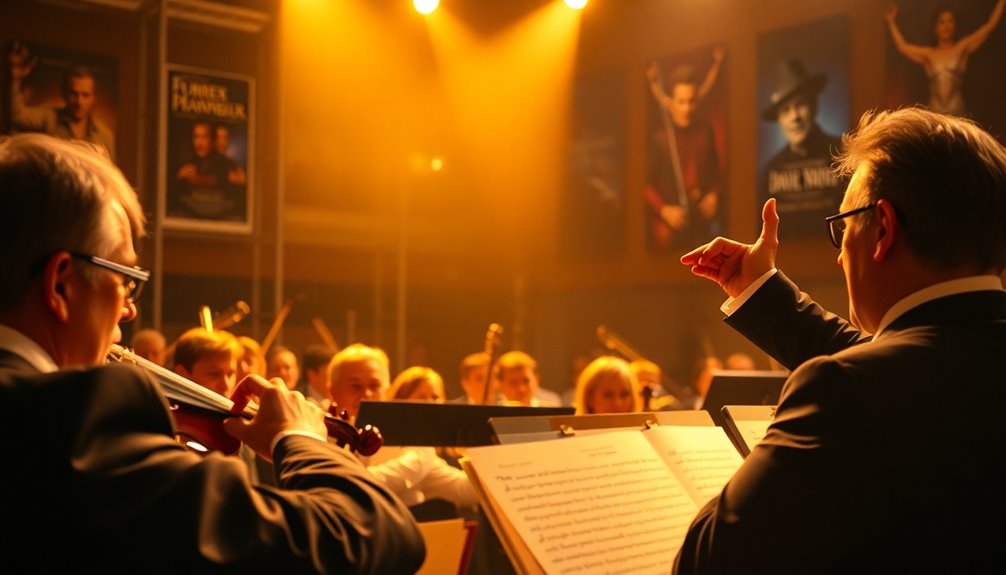
Film music has come a long way, shifting from the grand orchestral scores of early cinema to a blend of popular songs and contemporary styles that resonate with today's audiences. You can see how this evolution not only reflects cultural trends but also enhances the storytelling in films. This transformation marks a significant change in how music contributes to the cinematic experience. Multimedia elements have become essential in creating a more immersive and engaging atmosphere in films. As filmmakers prioritize performance optimization to enhance the overall viewer experience, the integration of music has become more sophisticated and impactful. Additionally, the use of intuitive navigation in film soundtracks can significantly enhance audience engagement, guiding viewers through emotional highs and lows.
Transition From Orchestral Scores
Shifting from orchestral scores to popular songs in film marked a significant evolution in the way music complements storytelling. This change began in the late 20th century, as audience preferences changed and filmmakers sought to incorporate contemporary artists into their soundtracks.
Soundtrack albums became commercially viable, and suddenly, songs featured in films began to soar on the charts, often becoming best-selling singles.
Advancements in music production technology allowed for diverse styles and genres to blend seamlessly into film scores, enhancing the storytelling experience and emotional depth.
You've likely noticed how this evolution brought forth notable composers like Hans Zimmer and Ennio Morricone, who skillfully merged traditional orchestration with modern elements. Their work illustrates how composers adapted to the changing landscape, enriching film music with innovative approaches.
This shift didn't just alter the backdrop of films; it transformed soundtracks into cultural touchstones that resonate long after the credits roll.
The integration of popular songs into films has created a dynamic relationship between music and storytelling, making you more emotionally connected to the narratives you love.
Popular Songs Integration
How did popular songs become integral to the film experience? The shift from traditional orchestral scores to the inclusion of popular songs reflects your changing tastes and cultural trends. You might recall how films began to feature theme music performed by well-known artists, making soundtracks a crucial part of the cinematic journey.
As soundtrack albums gained popularity, they turned into commercial products, leading to exciting collaborations between filmmakers and contemporary artists. This not only enhanced the visibility of the artists but also brought fresh sounds to film scores. The success of songs like "My Heart Will Go On" from Titanic (1997) illustrates this perfectly; that song became synonymous with the film, amplifying its cultural impact.
Now, when you watch a movie, you often hear recognizable tunes that resonate beyond the screen. These songs influence music trends and frequently pop up in commercials, sporting events, and various media, solidifying their place in pop culture.
The integration of popular songs into films redefined how you experience theme music, making it an inseparable part of storytelling and emotional connection in cinema.
Themes From Classic Movies
While many elements contribute to a film's success, iconic music themes often leave a lasting impression that resonates with audiences long after the credits roll.
These melodies not only enhance the cinematic experience but also become inseparable from the films they represent. Here are three classic movie themes that have stood the test of time:
- "Somewhere Over The Rainbow" from *The Wizard of Oz* (1939) – This Academy Award-winning song captures the essence of dreams and hope, becoming a beloved standard.
- "Boogie Woogie Bugle Boy" from *Buck Privates* (1941) – A wartime classic showcasing The Andrews Sisters, it resonated deeply during World War II, embodying the spirit of a generation.
- "As Time Goes By" from *Casablanca* (1942) – This iconic theme reflects nostalgia and love, forever linked to the film's most memorable moments.
These iconic themes not only elevate the films they belong to but also create emotional connections that linger in your mind, proving that music plays a crucial role in shaping our cinematic experience. Regular backups are essential to maintain the integrity of digital content, ensuring that data loss prevention becomes a priority for filmmakers and audiences alike.
Disney's Musical Legacy
Building on the theme of iconic music in film, Disney's musical legacy showcases the power of song in storytelling like no other. From the moment you hear "When You Wish Upon a Star" from *Pinocchio*, you can feel the enchantment that has defined Disney's impact on film music. This movie theme song set the standard for emotional depth, inspiring generations.
Another classic, "Have Yourself A Merry Little Christmas," originally from *Meet Me in St. Louis*, evolved into a beloved holiday staple, reflecting Disney's knack for transforming melodies into cherished traditions.
Disney's playful tunes, like "Baby, It's Cold Outside" from *Neptune's Daughter*, won an Academy Award, demonstrating the studio's ability to blend fun and storytelling seamlessly. In films such as *The Lion King*, songs like "The Circle of Life" bring characters and narratives to life, making you feel part of a magical wizarding world.
These memorable songs not only enhance the emotional landscape of the films but also create a cultural phenomenon, allowing you to connect with beloved characters long after the credits roll. Disney's musical legacy truly redefines how songs can shape a story.
Cultural Impact of Film Themes
When you hear a familiar film theme, it likely stirs up powerful emotions and memories tied to that movie.
These iconic compositions not only shape your viewing experience but also influence popular culture, appearing in everything from commercials to sporting events.
The lasting legacy of composers like John Williams and Ennio Morricone proves how deeply their music can resonate across generations.
Emotional Resonance With Audiences
Drawing listeners in with their rich melodies, iconic film themes have a profound ability to evoke emotions and create lasting connections with audiences. These compositions serve not just as background music but as essential components of storytelling, enhancing the emotional resonance of the films they accompany.
Here are three ways iconic scores impact you emotionally:
- Nostalgia: Themes like John Williams' "Hedwig's Theme" from Harry Potter draw you back into the magical world, evoking fond memories and feelings of wonder.
- Tension: Ennio Morricone's score for The Good, the Bad and the Ugly builds anticipation, heightening the excitement during critical moments, making you feel every bit of the drama.
- Timelessness: Songs like "My Heart Will Go On" from Titanic resonate across generations, reminding you of love and loss, ensuring the film remains relevant long after its release.
These iconic scores shape your emotional experiences, intertwining with cinematic storytelling and leaving a lasting imprint.
They remind you that music isn't just an accessory; it's a powerful tool that enhances the emotional depth of films, making them unforgettable.
Influence on Popular Culture
Iconic film themes have an undeniable influence on popular culture, as they transcend their cinematic origins to become part of everyday life. Take John Williams' compositions for *Star Wars* and *Harry Potter*, for example. These original themes are now cultural symbols that everyone recognizes, often referenced in various media.
The *Star Wars* theme alone received 4,638 votes in a poll by BBC Music Magazine, showcasing its widespread popularity and the profound influence on audiences worldwide.
Themes like Ennio Morricone's for *The Good, The Bad and The Ugly* and Hans Zimmer's for *The Lion King* have also carved their places in mainstream culture, appearing in commercials and sporting events. This integration shows how deeply these melodies resonate beyond the screen.
John Williams even composed six of the top ten film themes in that same poll, further illustrating his significant impact on film music and popular culture.
Moreover, the cultural significance of film themes lies in their ability to evoke nostalgia. Classics like "My Heart Will Go On" from *Titanic* have become synonymous with love and loss, shaping collective memories that live on in our hearts and minds.
Lasting Legacy of Composers
Although many might think of film themes as mere background music, their lasting legacy is woven into the fabric of our culture. Composers like John Williams and Ennio Morricone have created iconic themes that resonate far beyond their films, affecting how we experience stories in everyday life.
Here's how these themes shape our cultural landscape:
- Emotional Resonance: The simple two-note motif of Williams' Jaws score evokes fear and suspense, demonstrating how music can profoundly influence audience emotions.
- Cultural Significance: Morricone's work in The Good, The Bad and The Ugly remains a benchmark in the Western genre, showcasing the broader impact of film music.
- Pop Culture Integration: Themes from The Lord of the Rings and Pirates of the Caribbean have transcended their films, becoming staples in commercials and sports events.
The lasting legacy of these composers continues to inspire contemporary musicians, enhancing the emotional landscape of storytelling not just in film, but across various media.
Their iconic themes remind us that music isn't just an accompaniment; it's a fundamental part of the narratives we cherish.
Emotional Resonance in Scores
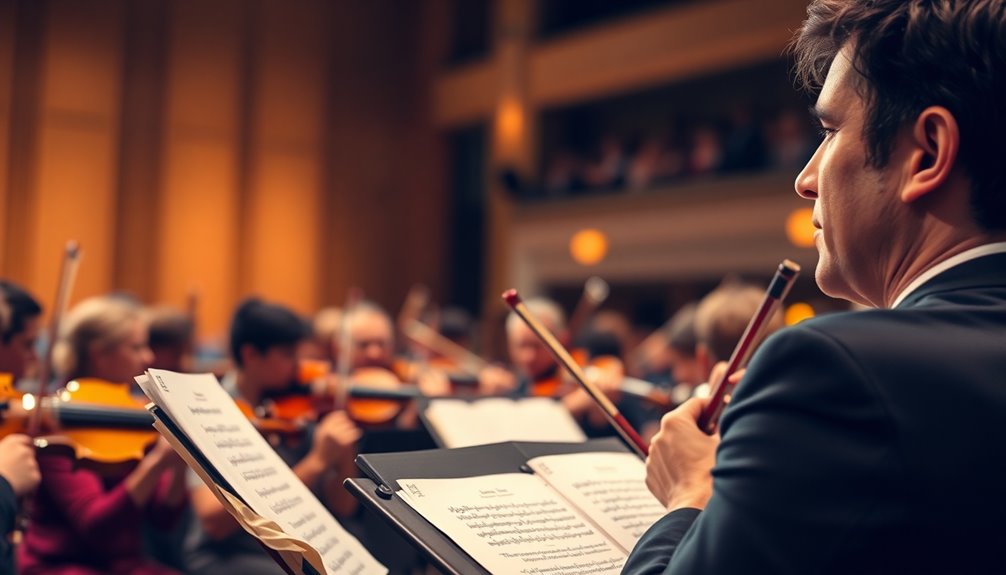
Emotion shapes our experience of film, and scores are pivotal in crafting that connection. They create emotional resonance that deepens your engagement with the story.
Take John Williams' iconic music themes from "Star Wars" and "Harry Potter," for instance. His melodies evoke nostalgia and wonder, transporting you to worlds filled with adventure and magic. Similarly, the haunting theme from "Titanic," particularly "My Heart Will Go On," stirs powerful feelings, amplifying the film's tragic love story.
Ennio Morricone's score for "The Good, the Bad and the Ugly" exemplifies how music can heighten tension and suspense, especially during those unforgettable standoff scenes. Each note pulls you into the heart of the action, making your pulse quicken.
Moreover, the use of leitmotifs, like the Shire theme in "The Lord of the Rings," guides your emotional journey. These recurring musical phrases represent characters and places, anchoring you to their experiences.
In every case, the emotional resonance created by these scores transforms ordinary moments into extraordinary cinematic experiences, reminding you of the profound impact music has on storytelling.
Memorable Motifs and Melodies
There's something undeniably enchanting about memorable motifs and melodies in film scores that stick with you long after the credits roll.
These iconic tunes often transcend their films, embedding themselves into the very fabric of popular culture. Just think about the following memorable examples:
- "Star Wars: A New Hope" – John Williams' epic score, which topped a 2019 poll with 20.76% of votes, is instantly recognizable and has become synonymous with adventure and heroism.
- "The Lord of the Rings: The Fellowship of the Ring" – Another Williams masterpiece, this theme ranked second with 5.85% of votes, capturing the essence of friendship and bravery in a fantastical world.
- "The Good, The Bad and The Ugly" – Ennio Morricone's score, placing fifth with 5% of the votes, is a significant cultural touchstone that perfectly embodies the Western genre's grit and drama.
These memorable motifs not only enhance our viewing experiences but also resonate beyond the screen, frequently utilized in commercials and sporting events, proving their lasting impact in our lives.
Iconic Performances and Covers
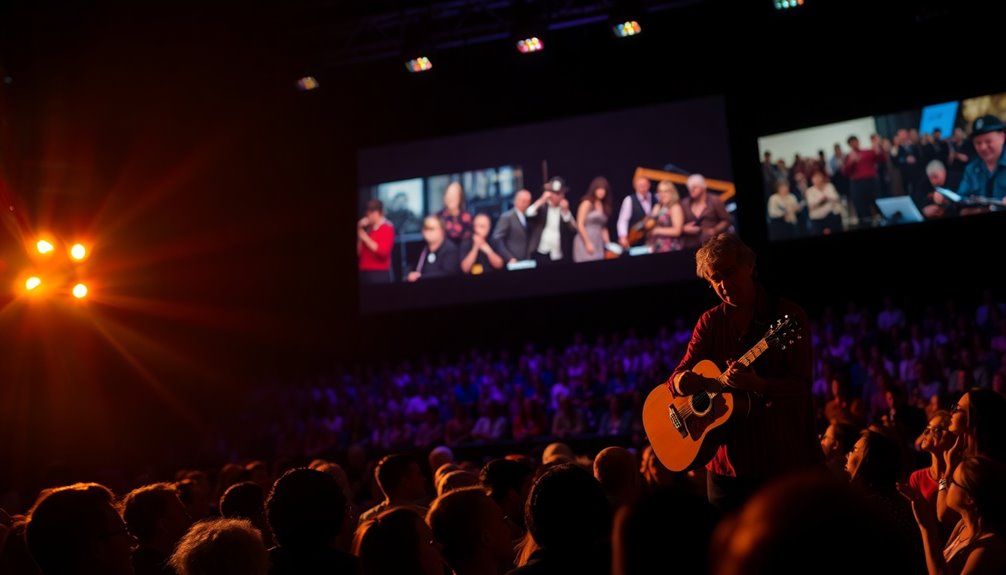
Memorable motifs and melodies aren't the only elements that leave a lasting impression; iconic performances and covers of film songs often breathe new life into these beloved pieces. Many artists have put their unique spin on original compositions, leading to renewed interest and fresh interpretations.
Take Whitney Houston's rendition of "I Will Always Love You" from The Bodyguard, for instance. Her powerful vocals transformed the song into a global hit and a cultural phenomenon.
Another standout is Celine Dion's "My Heart Will Go On" from Titanic, which became one of the best-selling singles of all time, capturing hearts worldwide. Covers can also introduce classic themes to new generations, like Israel Kamakawiwoʻole's version of "Somewhere Over the Rainbow," which gained immense popularity in the 1990s.
Even iconic themes such as "The Godfather's" main theme have been reimagined by various artists, enhancing their legacy and ensuring they remain relevant.
These iconic performances not only honor the original compositions but also create a bridge between the past and present, allowing both old fans and new listeners to connect with the music in meaningful ways.
Awards and Recognitions
When you think about iconic film themes, it's hard to ignore the accolades they've earned.
Many have snagged Academy Awards for Best Original Song, while others have topped charts as best-selling soundtrack singles.
Plus, unforgettable performances by legendary artists have further cemented these themes in our cultural landscape.
Academy Award Winners
Recognizing the enduring power of music in film, the Academy Awards have celebrated numerous iconic songs that elevate cinematic storytelling. Winning the Oscar for Best Original Song not only honors the artists but also cements these tracks in the fabric of popular culture.
Here are three notable winners that have left a lasting impact:
- "My Heart Will Go On" from *Titanic* – This haunting ballad became synonymous with the film and remains a staple in romantic playlists.
- "Let It Go" from *Frozen* – With its empowering message, this anthem captivated audiences worldwide, becoming a cultural phenomenon.
- "Over the Rainbow" from *The Wizard of Oz* – A timeless classic, this song continues to evoke nostalgia and hope across generations.
The Academy Awards haven't only recognized these incredible songs but also highlighted the contributions of composers like John Williams, who's earned multiple Oscars for his film scores.
Winning an Academy Award often propels these songs into best-selling territory, showcasing their emotional depth and resonance with audiences. This recognition underscores the essential role music plays in enhancing storytelling and shaping cinematic experiences.
Best-Selling Soundtrack Singles
Soundtrack singles haven't only captured audiences' hearts but also achieved remarkable commercial success, often accompanied by prestigious awards. Many best-selling soundtrack singles have become instantly recognizable, embedding themselves deeply into pop culture.
For instance, "My Heart Will Go On" from *Titanic* not only defines the film's legacy but also won numerous accolades, showcasing its impact.
Another standout is "I Will Always Love You" from *The Bodyguard*, which became one of the best-selling singles of all time. Its powerful performance and emotional depth exemplify the magical intersection of film and music.
Disney's influence is undeniable, particularly with "A Whole New World" from *Aladdin*, which won an Oscar and remains a beloved classic, enchanting generations of fans.
Additionally, soundtracks like *The Lion King* have produced songs like "Circle of Life," achieving both commercial success and critical acclaim.
These best-selling soundtrack singles not only highlight the significance of music in film but also resonate with audiences long after the credits roll, solidifying their place in cinematic history.
It's clear that these songs are more than just tunes; they're anthems that celebrate unforgettable stories.
Iconic Artist Performances
Iconic performances by artists have transformed movie songs into cultural phenomena, often earning prestigious awards and solidifying their place in film history.
These performances not only showcase vocal talent but also elevate the emotional connection audiences have with the films.
Here are three standout moments that highlight the impact of these iconic artist performances:
- Celine Dion's "My Heart Will Go On" from *Titanic* – This powerhouse ballad won the Academy Award for Best Original Song and became synonymous with the film's tragic romance.
- Judy Garland's "Over the Rainbow" from *The Wizard of Oz* – A timeless classic, this song not only won multiple accolades but also captured the hopes of generations.
- Henry Mancini's "Moon River" from *Breakfast at Tiffany's* – This enchanting melody earned the Oscar for Best Original Song, and its popularity continues to inspire countless covers.
These iconic artist performances haven't only secured awards but also left an indelible mark on film music, proving that the right song, delivered by the right artist, can resonate through time.
Future of Film Music
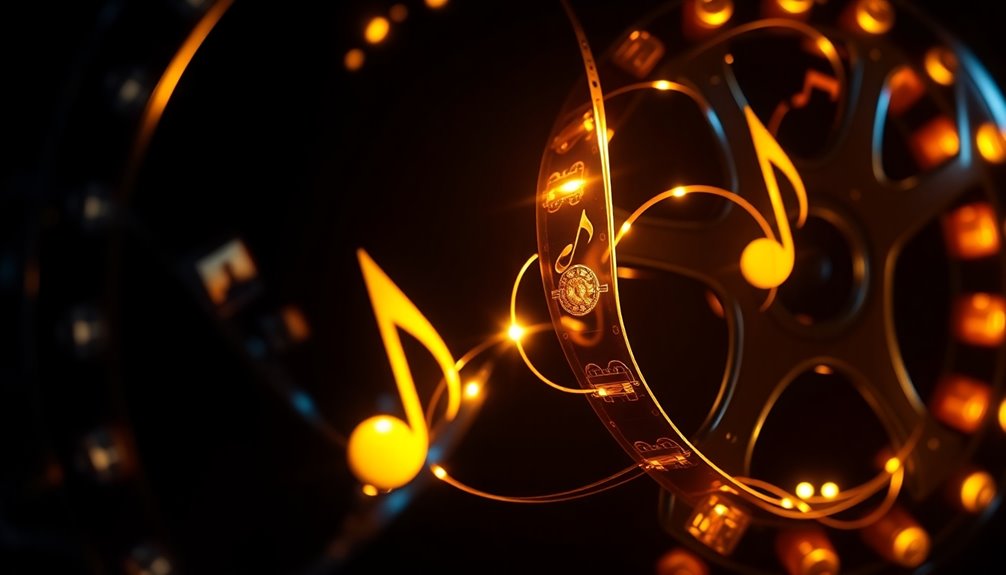
The future of film music promises to be vibrant and dynamic, with countless opportunities for emerging artists to collaborate with filmmakers. As technology advances and music consumption evolves, you can expect innovative compositions that redefine soundtracks. The integration of original scores with popular music will likely expand, allowing filmmakers to connect with younger audiences through familiar tunes. This shift not only enhances the viewing experience but also opens doors for fresh talent.
Cross-genre collaborations between contemporary artists and traditional film composers are on the rise. Imagine the fusion of electronic beats with orchestral arrangements, creating a rich tapestry of sound that enhances storytelling. This blending of styles will bring diversity to film scores, making them more relatable and engaging.
Additionally, the ongoing exploration of lesser-known themes and composers will celebrate a broader range of musical styles and histories. As you investigate these unique sounds, you'll appreciate the cultural significance of film music even more.
Exploring Lesser-Known Themes
Many film lovers might overlook the rich tapestry of lesser-known themes that offer unique soundscapes and emotional depth.
While blockbuster scores often steal the spotlight, there's a wealth of talent in the shadows waiting to be appreciated.
Here are three standout themes that deserve your attention:
- "The Secret of NIMH" by Jerry Goldsmith – This score captures the intricacies of survival and sacrifice, evoking powerful emotional responses that enhance the film's storytelling.
- "Cinema Paradiso" by Ennio Morricone – Known for its poignant melody, this theme resonates deeply, reminding us of love and nostalgia, despite its less commercial recognition.
- "The Fountain" by Clint Mansell – An innovative blend of orchestral and electronic elements creates a hauntingly beautiful soundscape that transcends typical film scores.
Exploring these lesser-known themes not only enriches your understanding of film music but also highlights the diverse styles and emotional nuances that composers bring to life.
Conclusion
As you journey through the world of film music, you'll find that iconic themes are the heartbeat of cinema, echoing emotions and memories long after the credits roll. From John Williams' unforgettable scores to the hidden gems waiting to be discovered, each note tells a story. As film evolves, so will its music, promising new symphonies to capture your imagination. So, keep your ears open—who knows what stunning melodies await in the next cinematic adventure?


